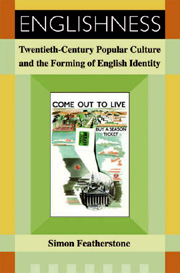9 - Romance
Published online by Cambridge University Press: 12 September 2012
Summary
The exploitation of reticence, parody and pastiche that characterised Noël Coward's songwriting in the 1930s and 1940s is also evident in his script for the classic film of English romance, Brief Encounter (1945). The film presents what became a much-parodied vision of provincial middle-class England in which the two married lovers sacrifice their passion for family and social propriety. As often in English popular culture, though, Brief Encounter engages obliquely with wider questions of national identity and the social and cultural conflicts that frustrate and complicate its expression. Here it concerns the role of gender in the making of nationhood and the peculiar uncertainties of its role in Englishness. As was noted in the Introduction, England never ‘adopted [an] ideal of manliness and built its national stereotypes around it’ in the way that George Mosse argued was characteristic of nineteenth- and twentieth-century European nationalisms (Mosse 1985: 10). Instead, a far less secure projection of both masculine and feminine roles was evident in the national organisations of the early twentieth century – the Scouts and Guides, the folk-dance movement and the Women's Institutes, for example. George Orwell argued something similar in ‘The Lion and the Unicorn’ when he defined popular mistrust of militarism as a particular feature of Englishness (Orwell 1968: 79). Patriarchy may have shaped and dominated English institutions, as Virginia Woolf argued in Three Guineas, but overt displays of masculinity as defining of nationhood were rare.
- Type
- Chapter
- Information
- EnglishnessTwentieth-Century Popular Culture and the Forming of English Identity, pp. 159 - 177Publisher: Edinburgh University PressPrint publication year: 2008



